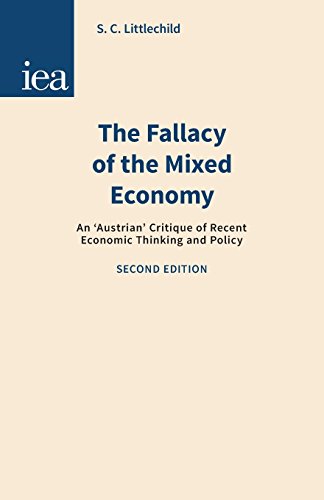Background
LITTLECHILD, Stephen Charles was born in 1943 in Wisbech, Cambridgeshire, England.


(There is a resurgence of interest in the 'Austrian School...)
There is a resurgence of interest in the 'Austrian School' of economics, notably the work of Menger, Mises and Hayek. In contrast to neoclassical economics, the Austrian school has always emphasised the importance of incorporating differences in knowledge, beliefs and expectations into economic analysis. This approach leads to the notion of competition as a dynamic process of discovery and co-ordination, instead of a static state of general equilibrium. Market devices such as product differentiation and advertising, long condemned as uncompetitive, are evidence that the market process of discovery and coordination is working. Neoclassical welfare economics envisages an important role for government as correcting 'market failure' and hence supports the concept of a mixed economy. Austrian economics casts doubt on the ability of government to acquire the knowledge necessary to improve upon the market. The Monopolies and Mergers Commission is an inadequate safeguard for consumers, and prohibiting mergers may limit competition. A more effective protection against monopoly would be the abolition of patent laws. Marginal cost pricing and investment rules provide a naive and unenforceable framework of control for nationalised industries. Consumers could be better safeguarded by the abolition of statutory monopolies. 'External' nuisances like noise and pollution are more effectively dealt with by making producers legally liable for them, and by creating property rights to be traded on markets, than by cost-benefit analyses or 'externality taxes'. Planning agreements are likely to hamper the competitive process. There is no reason to believe the National Enterprise Board will make better decisions than the market. Austrian economics suggests that the free market will be more effective than the 'mixed economy' in discovering and meeting the wishes of consumers.
http://www.amazon.com/gp/product/0255366337/?tag=2022091-20
economist educator director utility company
LITTLECHILD, Stephen Charles was born in 1943 in Wisbech, Cambridgeshire, England.
Bachelor of Commerce University Birmingham, 1964. Doctor of Philosophy (Business Administration, Computer Science, Mathematics), University Texas, 1969.
Assistant lecturer industrial economics, member faculty University Birmingham, 1964-1965. Harkness fellow Stanford University, Palo Alto, California, 1965-1966, Northwestern University, Evanston, Illinois, 1966-1968, University Texas, 1968-1969. ATT postdoctoral fellow University of California at Los Angeles and Northwestern University, 1969.
Senior research lecturer economics Graduate Center for Management Studies University Birmingham, 1970-1972. Professor applied economics, head economics and econometrics management center Aston University, Birmingham, 1972-1975. Professor commerce and head industrial economics and business studies University Birmingham, 1975-1990.
Director general of electricity supply Office of Electricity Regulation, Birmingham, since 1990. Visiting scholar department economics, University of California at Los Angeles, 1975. Visiting professor Stanford University, University Chicago, Virginia Polytechnic Institute and State University, 1979-1980.
Member Monopolies and Mergers Commission, 1983-1989. Member advisory committee on energy research and development, Secretary of State, 1987-1989.
Harkness Fellow Commonwealth Fund, 1965-1967. Foundation for Management Education Fellow,
9. American Telephones & Telegraph Post-doctoral Fellow Public Utility Economics, 1969.
Member, United Kingdom Monopolies and Mergers Commission, 1983.
(There is a resurgence of interest in the 'Austrian School...)
(There is a resurgence of interest in the 'Austrian School...)
(Book by Littlechild, S. C.)
Author: Operational Research for Managers, 1977, The Fallacy of the Mixed Economy, 1978, second edition, 1986, Elements of Telecommunications Economics, 1979, Energy Strategies for the United Kingdom, 1982, Regulation of British Telecommunications Profitability, 1983, Economic Regulation of Privatised Water Authorities, 1986. Contributor over 50 articles to professional journals.
Mathematical programming characterisations and calculations of public utility pricing structures, with applications to telephone calls, water resources and energy. Qualitative and quantitative analysis of common cost-sharing using co-operative game theory, with introduction of the Birmingham Airport game. Industrial organisation and public policy from an ‘Austrian’ perspective.
Privatisation of United Kingdom nationalised industries, especially telecommunications.
Football, genealogy.
Son of Sidney F. and Joyce M. (Sharpe) L. Married Kate Crombie, 1974 (divorced 1982). 3 children.
